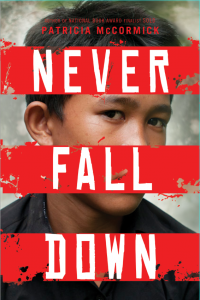Patricia McCormick, the Crusading Journalist and Writer for Young Adults

“There is probably a dim spot in all of our memories when we come to think of the Cambodian war of the 1970s that destabilized the country with an extremist communist regime.”
The words of Patricia McCormick, the National Book Award finalist, addressed to her audience at the Criss Library, University of Nebraska at Omaha a couple of years back still ring in my ears. All this while, whenever I have opened the pages of her novel ‘Never Fall Down’ based on the Cambodian Revolution, I have been touched not only by her craft and her power of intimate storytelling, but also by her intent in writing the achingly raw and engrossing novel, to empower the voices of the abused, the marginalized, through the narrative of the survivor of the sadistic Khmer Rouge, Arn Chorn Pond.
‘Never Fall Down’ is a haunting, hopeful piece of fiction that largely draws on the life of Arn Chorn Pond, the brave, spirited survivor of the late ’70s Cambodian Revolution. In the book, McCormick provides some vivid accounts of the atrocities, the tragic separation of children and families trapped by the tyranny of the Khmer Rouge in Cambodia. In the same breath, she talks about the protagonist Arn, the courageous survivor whom she met through a neighbor in New York. The storytelling is simple yet captivating, tracing his quest to find ultimate redemption from the gruesome torture he was subject to.
The narrative of the book is an account of an 11-year-old boy filled with confusion and bewilderment; so the language, fragmented and sporadic, had been deliberately chosen to maintain the point of reference of the protagonist. “It is the language of the young adult,” she added in her talk about the novel, as the war was taking over the country, as children were being brutally pulled out of the fields and handed weapons.
It has never been an easy task to talk to a traumatized war victim who could never tell the story of his life in a linear fashion. For the purpose of her book, it had been important to pose a series of questions to the protagonist at random and then work toward attaining a chronology of the events in a diary format.
However, even with such a real, gripping human story, her book ‘Never Fall Down’ is not devoid of light-hearted humor, with sections recounting some of Arn’s delightful childhood experiences in Cambodia, his hometown where he remembers his earliest memories of dancing to rock ’n’ roll, of selling ice cream along with his brother. Today, though Arn has found a new lease on life by being adopted by a family in the United States, and also being an activist, musician and speaker, he is still trapped as the surviving child of 1970s Cambodia, remembering graphic details of the torment he was subject to by joining a band in the prison camp. The book, McCormick says, is an account of his voyage, where he gradually discovers music to be his savior in the midst of the incredible cruelty and inhumanity around him. The purpose of the book, like all of her previous works of fiction, is to save the soul and culture of the people she portrays, with an emphasis on the courage of the human mind, with an ultimate goal to make the world a better place for all.
For a writer whose tryst with the written world began with her foraying into journalism, writing for the print media had served as a passport to her curiosity. However, as she waded through the path of newspapers and magazines for years, the epiphany of being an author struck her gradually as she discovered how fiction was ultimately more powerful and true. “It’s the relationship with the characters I portray that makes fiction so unique, and with it, you have the best of both worlds, and the liberty with your imagination to expand the story,” I remember her immensely engaging words in my brief conversation with her during her book reading.
Her words resonate with those who have come across the repertoire of her fiction, which includes the National Book Award finalist ‘SOLD’ (2007), ‘Purple Heart’ (voted by “Publishers Weekly” as the best book of 2009) and ‘CUT’ (described by the Boston Globe as “one of the best young-adult novels in years”). Looking into the gripping, intense, true-life stories that inspire her works of fiction, the roles of literary journalism and of extensive research shine through. “It is important that you saturate your memory and senses with the details you absorb from newspaper stories, chance meetings and from daily life,” she commented, as she talked about the themes, the inspiration behind her stories and the techniques of her writing.
As for “SOLD,” the novel which gave her national acclaim, she was passionate to expose the seething reality of sex trafficking in India and Nepal, to convey the horrific details of the girls and their families who forced them into prostitution. The book, replete with rich details of the protagonist Laxmi’s village in Nepal, her voyage to India, her experiences with the flesh trade in a brothel in Kolkata, gave the readers a slice of the daunting, hopeless world of the young girls where they are perceived as sex commodities. Talking about the inspiration behind the book, she mentioned the organizations in Nepal and India that helped her develop the human story and also spoke about the unassuming village in Nepal that gave her the stimulus to take in every minute detail, while turning it into an extensive research for her book.
 The uniqueness of McCormick’s narrative lies in her implementation of the techniques of literary journalism and research. While she follows multiple situations, she eventually consolidates them all in her stories. She does it in ‘SOLD’, where she frames a composite character based on the bits and pieces of research collected from the individual stories of the girls she interviewed. Through the narrative of ‘SOLD’, McCormick seeks to break the taboo and unfold the history behind the blemished identities of the girls victimized by sex trafficking. In writing the book, her goal has been to “outrage the dream readers of the book” to the extent that they would desperately look to get involved in rescuing and rehabilitating those hapless girls. McCormick’s fiction largely revolves around some of the most gripping stories of terror, abuse, vulnerability and survival of the protagonists. It is the magic of narrating these gruesome tales with the precision of language, the minute details of research, that draws the readers to the books. The narratives in her fiction primarily focus on the young adults as her principal readers. For example, the narratives in her fiction, including ‘Never Fall Down’, ‘SOLD’, ‘Purple Heart’ and ‘CUT’ are often the narratives of young people, used as innocent frames of reference. It is the terror and vulnerability of these young voices as well as their ultimate strength to fight back their precarious situations that stimulate her as a writer.
The uniqueness of McCormick’s narrative lies in her implementation of the techniques of literary journalism and research. While she follows multiple situations, she eventually consolidates them all in her stories. She does it in ‘SOLD’, where she frames a composite character based on the bits and pieces of research collected from the individual stories of the girls she interviewed. Through the narrative of ‘SOLD’, McCormick seeks to break the taboo and unfold the history behind the blemished identities of the girls victimized by sex trafficking. In writing the book, her goal has been to “outrage the dream readers of the book” to the extent that they would desperately look to get involved in rescuing and rehabilitating those hapless girls. McCormick’s fiction largely revolves around some of the most gripping stories of terror, abuse, vulnerability and survival of the protagonists. It is the magic of narrating these gruesome tales with the precision of language, the minute details of research, that draws the readers to the books. The narratives in her fiction primarily focus on the young adults as her principal readers. For example, the narratives in her fiction, including ‘Never Fall Down’, ‘SOLD’, ‘Purple Heart’ and ‘CUT’ are often the narratives of young people, used as innocent frames of reference. It is the terror and vulnerability of these young voices as well as their ultimate strength to fight back their precarious situations that stimulate her as a writer.
“While as the human, I was totally sad and devastated to know their stories, as the writer, I was the vulture, the crusading journalist collecting the details.” She said.
It is this very subtle, real interplay of compassion, intuition and research that forms the essence of her identity as a writer combining facts with fiction. In the near future, when she thinks teenagers in the nation should be increasingly aware of whatever is happening to other teenagers across the globe, her novels will hopefully continue to influence young minds with her bold, truthful rendering of human stories.
Lopa Banerjee is a poet, author, translator and editor currently based in Dallas, TX.



